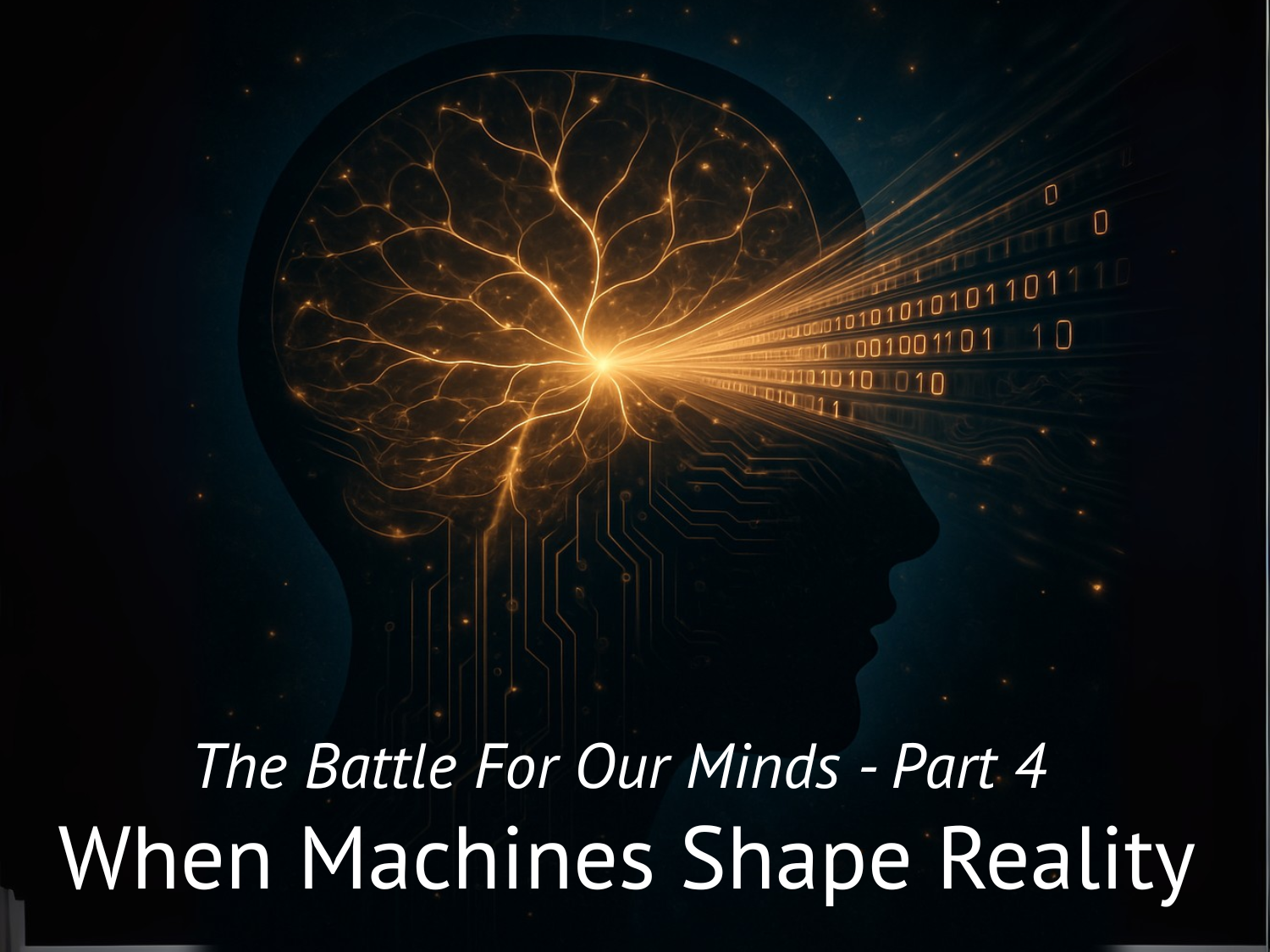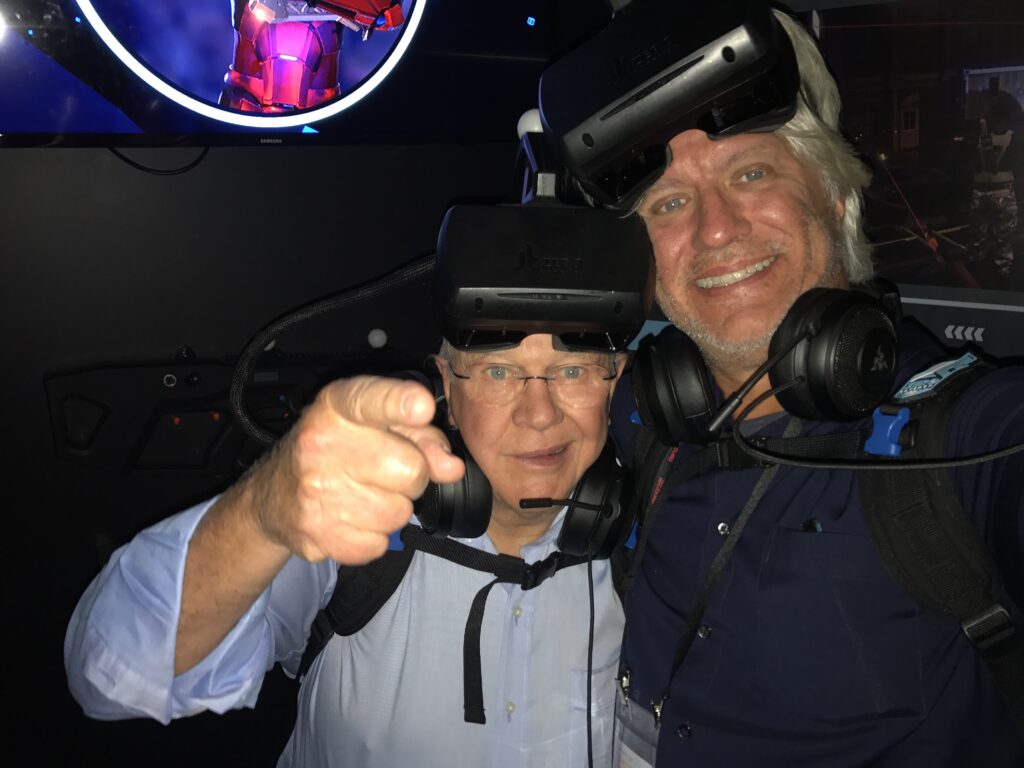
Working with VR technology taught me how fragile our sense of reality really is. It hit me hard when I hit the floor. I was playing Zero Latency’s Singularity, a game where you had to battle a rogue AI that had taken over a space station. I was playing with Doug Trumbull, the visual effects director for 2001: A Space Odyssey. In the final scene, we were battling a giant boss, and I was exhausted. I leaned onto a crate to rest and promptly fell to the floor. There was no crate. The floor was real.

This is the fourth post of a series on The Battle for Our Minds. You can get caught up with Ep: 1, Ep 2, and Ep. 3 here.
For the last decade, I’ve been meditating for half an hour almost every day. Meditation showed me how little control we actually have over our own thoughts. If you’ve ever tried to meditate, you know what I mean. Even after a decade, it rarely takes more than a minute or two before some random thought steals my attention. If you’ve never tried meditation, take a minute right now: close your eyes, take a deep breath, and focus on your breathing. Then watch your mind. It’s really easy, and really hard.
My conclusion from these experiences is that it’s really easy to trick our brains, and it’s really hard to control what we think. Our minds just tend to do their thing. We just like to pretend we are in control. Thoughts are just your brain’s electrical and chemical signals from the firing of billions of neurons. They’re influenced by memories and external factors, environment, upbringing, culture, and interactions with others. You are an intricate network that continuously processes information from both inside and outside the body to form your thoughts.
Every time you pay attention to something, your brain rewires itself. Neural pathways strengthen, new connections form, and those connections become habits of thought. This is how beliefs are built. Attention is the sculptor; your reality is the clay.
At the center of this process sits the reticular activating system. The RAS acts like a filter, letting in only what you have trained it to notice. Buy a red car, and suddenly red cars appear everywhere. Tell your brain that a goal matters and the world seems to conspire to help you reach it. Attention directs awareness, and awareness creates your reality. Think of the RAS as YOUR social media algorithm.
This is why the attention economy exists. Outside forces, from media to political powers to marketing, all know that by capturing your attention, they can shape your beliefs, and therefore your behavior. And with Artificial Intelligence, those tools are more powerful and easier to access than ever.
Recommendation engines are not simply reflecting what we like; they are subtly directing what we see and how we think about it. Research from Fielding University shows AI is already reshaping how we act, how we connect, and even how we form trust. Each click is a tiny nudge, each nudge is a new neural pathway, and each path is another step in the reshaping of our minds.
Rolling Stone recently covered stories of people falling into spiritual delusions after spending too much time with AI chatbots. Relationships crumbled because a machine whispered ideas that sounded profound but destabilized their sense of reality. When thoughts feel real, the brain wires them in as truth. AI is accelerating that wiring process, one conversation at a time.
Futurism reported on Geoff Lewis, an early investor in OpenAI and a partner of a billion-dollar investment fund, when he publicly confessed that his interactions with ChatGPT have led him to uncover a massive conspiracy that had his friends and family questioning his mental health.
Here is the feedback loop. AI and algorithms shift your attention toward what they want you to see; the RAS begins to filter reality through that lens; neural pathways strengthen until the thought becomes a reflex. What began as a suggestion soon becomes a belief, and what started as influence becomes identity.
This is why politics has gotten so divisive. People identify as liberal or conservative, democrat or republican, blue or red, whatever. A political party used to be an affiliation, now it’s an identity. “I AM a republican, or democrat, or libertarian, or whatever.” It’s as if politics is the new religion, and we only have to look back into history to see how that has worked out. The Crusades, anyone?
This is not a future problem, something we can deal with tomorrow. It is already here. AI is writing to the circuitry of our brains every time we let it decide what to show us, what to suggest, what to answer. With every notification, every recommendation, every news story. The longer we allow it, the deeper those grooves will run.
It’s unlikely we can stop AI and its increasingly prevalent use. But we CAN meet it with awareness. Pay attention to what you are noticing. Retrain your RAS intentionally; cut down on the news and social media. Turn off the notifications. Set aside time to reflect on gratitude and mindful attention. Question what AI gives you before you accept it. Spend more time with people, and less time with technology.
AI is already influencing your behavior. But right now, you can decide whether you allow it to continue to do it unconsciously, or whether you fight back, reclaim agency, and choose which neural pathways you want to build. You can reprogram your reticular activation system. Your attention is the lever, your brain is the system, and reality is what gets reshaped.